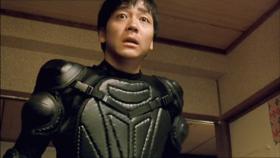
Imagine the Japanese unquiet-ghost anthology Kwaidan cross-bred with The Neverending Story and directed by Terry Gilliam. That's the gist of The Great Yokai War, an honest-to-god children's movie from the chameleonic Japanese genre director Takashi Miike. In a little more than two hours, Miike runs roughshod over centuries of Japanese folk tales, spinning a yarn that has a young boy, Tadashi, chosen as the rider of the Kirin -- sort of a cross between a dragon and a unicorn, but also, as the film eventually reminds us, a tasty Japanese brew. He finds himself drawn into the titular war of the Yokai, Japanese spirits that take many radically different forms.
Though you may have seen them get up to mischief or worse in other movies, the Yokai depicted here are a fairly easygoing sort. Apparently directly inspired by the work of horror manga artist Shigeru Mizuki, they're represented as a dazzling array of old-school movie creatures. There's a one-eyed umbrella, a one-legged blacksmith, a blue-lit girl with long dark hair (she's become a recent genre trope), and even a large stone wall with a couple of beady peepers. Tadashi's allies in his quest are a beaked turtle-man (Sadao Abe), a river princess (Mai Takahashi), the red-skinned General Nurarihyon (Kiyoshiro Imawano, also seen in Miike's Happiness of the Katakuris), and a little hamster-like critter, dubbed Sunekosuri, who likes to rub against his shins and ride on his head.
Because this is a Miike movie, bad things eventually happen to Sunekosuri, and whether the director has succeeded in making an adventure that's truly family-friendly will depend on your family. In the single most outré moment in the whole picture, a horrifying newborn calf straight out of Heironymous Bosch by way of John Carpenter's The Thing delivers a pretty indisputable omen of approaching evil -- if the kids make it through that early scene without running for the covers, they'll probably be fine with everything else that happens. The exhibition may be baffling to anyone without a passing familiarity with Japanese supernatural stories, or with the kind of logic that drives contemporary manga and anime.
To wit: the dapper villain here is a malevolent-genius type (Etsushi Toyokawa) who is harnessing the resentful energy of thoughtlessly discarded objects to create evil mutant Yokai that do harm to their more benign counterparts. Working in tandem with a white-haired whip-wielding lackey in a miniskirt named Agi (the sensational Chiaki Kuriyama from Battle Royale and Kill Bill Vol. 1), his stated goal is to plunge the world of humans into darkness. (What exactly he hopes to gain by doing this isn't exactly clear; presumably he's a misanthrope.) He takes a big step in the right direction by landing a toothy, flying demon on top of downtown Tokyo, kicking off one of the awesomest apocalyptic climaxes to date.
Of the half-dozen Miike films I've seen -- an almost insignificant sample size given the sheer prodigiousness of the man's output (70 IMDb directorial credits since 1991 and counting) -- this is one of the best, second in my mind only to Audition. Miike's made a number of must-see films, largely notable for their flamboyance and perversity, and The Great Yokai War represents a departure from the bulk of his output. But what dogs his ouvre is the sense that, though he's facile in many modes, none of them are personal to him. His movies are designed to give audiences a specific, highly manipulated experience that reveals next to nothing about what really makes Miike-san tick. (I believe, for example, that Audition is a ferocious indictment of Japanese men's attitudes toward women, but I don't know that anything else in Miike's body of work supports that reading in an auteurist sense.)
Other writers are comparing The Great Yokai War to everything from Spirited Away to H.R. Pufnstuf, but I really feel that it's closest in tone to The Adventures of Baron Munchausen, and whatever that film's flaws are, Gilliam manages to convey a real sense of wonder that's missing from Miike's more glib and ironic vision. Maybe this is just a film that's of its times. (Did you see the Applebee's commercial that quite literally interrupted Talladega Nights? Miike ventures into that territory here.) It culminates, unconvincingly, in some pointed anti-war dialogue (do as I say, children, not as I do) and a tossed-off coda showing how, as young people get older, they lose the ability to engage with the magic around them. Despite my reservations, it's quite a picture -- tantalizingly close to a bullseye.
Source note: I picked this up on a Region 2 DVD in Chinatown after missing its unheralded theatrical run in New York. I understand it's coming out next month on a domestic DVD from Media Blasters.

